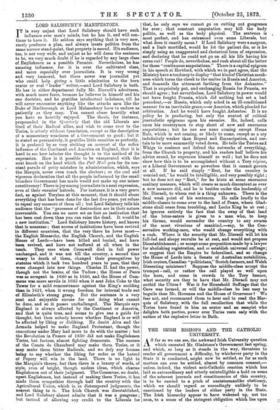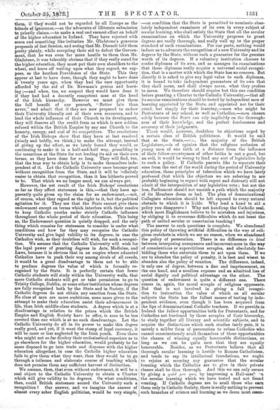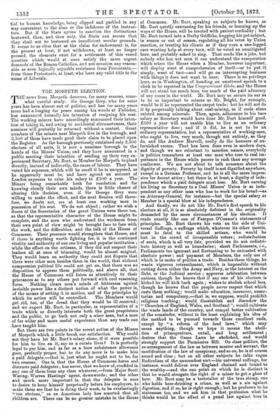THE IRISH BISHOPS AND THE CATHOLIC UNIVERSITY.
AS far as we can see, the awkward Irish University question which unseated Mr. Gladstone's Government last spring, and which, so long as it stands in the way, threatens to render all government a difficulty, by whichever party in the State it is conducted, might now be settled, so far as such matters can ever be settled, almost by common consent,— unless, indeed, the violent anti-Catholic reaction which has laid so extraordinary and utterly unintelligible a hold on some of the soberest journals and constituencies of this country, is to be carried to a pitch of unatatesmanlike obstinacy, which we should regard as exceedingly unlikely to be sanctioned by the leaders of either party in the State. The Irish hierarchy appear to have wakened up, not too soon, to a sense of the stringent obligation which lies upon them,- if they Would not be regarded by all Europe as the faibnda ef ignorance,—as the advocates of illiterate submission to priestly claims,—to make it real and earnest effort on behalf of the higher education' in Ireland. They have rejected with scorn and something like-irritation Mr. -Cfladstone's generous proposals of -last Session, and seeing thafMr. Disraeli told them pretty' plainly, while accepting their-aid to defeat the Govern- remit, that he was even far more hostile to them than Mr. Clhidstone, it was tolerably obvious that-if they really cared for the higher education, they must put•their own shoulders to the wheel, and leave off waiting upon what they regard, we sup- pose, as the heathen Providence of the State. This they appear at last to have done, though they ought to have done it twenty years ago, when they had the rare opportunity afforded by the aid of Dr. Newman's genius and learn- ing ;—and when, too, we suspect they would have done it if they had had a decently competent man at the head of the Irish hierarchy. However we must give them the full benefit of our proverb, "Better late than never," and admit that if they are now prepared to endow their University liberally out of their own resources, and to lend the whole influence of their Church to its development, they will deserve all the credit from us which is now seldom refused within the British Empire by any one Church to the honesty, energy, and zeal of its competitors. The resolutions of the Irish Bishops show that they have at last resolved (wisely and boldly, we think,) to make the attempt, instead of giving up the effort, as we lately feared they would, or continuing to make it in a half-and-half way, grumbling in the meantime at the State for not lending its aid on their own terms, as they have done for so long. They will find, too, that the true way to obtain help is to make themselves inde- pendent of it. Let the Catholic University once become great without recognition from the State, and it will be infinitely easier to obtain that recognition, than it has hitherto proved to be. That which we no longer need, we can always get.
However, the net result of the Irish Bishops' resolutions as far as they affect statesmen is this,—that they have ap- parently quite given up the claim for an endowment,—not, of course, what they regard as the right to it, but the political agitation for it. They see that the State cannot give them endowment except on terms which interfere with their resolve to keep Catholic youths under strictly Catholic influence throughout the whole period of their education. This being so, the Endowment question is quietly dropped, and the only thing which remains for statesmen to consider is under what conditions and how far they may recognise the Catholic University and give legal validity to its degrees, in case the Catholics wish, as they doubtless will wish, for such a recogni- tion. We assume that the Catholic University will wish for the legal power of granting degrees in Arts, Medicine, and Laws, because it is obvious that in an empire where educated Catholics have to push their way among rivals of all creeds, it would be a great disadvantage to them not to be able to produce degrees the value of which is formally re- cognised by the State. It is perfectly certain that fewer Catholic students will study within the University walls, that more Catholic students will get or take permission to go to Trinity College, Dublin, or some other institution whose degrees are fully recognised both by the State and in Society, if the Catholic degrees do not obtain any sanction from the State. No class of men are more ambitious, none more given to the attempt to make their education assist their advancement in life, than Irish middle-class students. A degree which is at a disadvantage in relation to the prizes which the British Empire and English Society have to offer, is sure to be less coveted than one which is at no such disadvantage. Let the Catholic University do all in its power to make this degree really good, and yet, if it want the stamp of legal currency, it will be more or less neglected by the Irish youth. Even those who might not so far disobey their ecclesiastical superiors as to go elsewhere for the higher education, would probably be far more disposed to go into trade and dispense with the higher education altogether, in case the Catholic higher education fails to give them what they want, than they would be to go through a toilsome and elaborate course of teaching which does not promise them any sufficient harvest of distinction.'
We assume, then, that even without endowment, it will be a real object to the Catholic University to obtain a Charter which will give validity to its degrees. On what conditions, then, could British statesmen accord the University such a recognition Oar answer, and we imagine the answer of almost every sober English politician, would be very simple,
—on condition that the State is permitted to nominate abso- lutely independent examiners of its own in every subject of secular learning, who shall satisfy the State that all the secular examinations on which the University proposes to grant degrees are really thorough, and really well up to the proper standard of such examinations. For our parts, nothing would induce us to advocate the recognition of a new University and its degrees by the State, without such a guarantee for the genuine worth of its degrees. If a voluntary institution chooses to confer diplomas of its own, and so manages its examinations that these diplomas really acquire a universal social recogni- tion, that is a matter with which the State has no concern. But directly it is asked to give any legal value to such diplomas, it is bound to take independent guarantees of its own that they shall mean, and shall always mean, what they profess to mean. We therefore should require but this one condition before granting a Charter to the Catholic University,—that all its secular examinations should be tested by independent men of learning appointed by the State, and appointed not for their creed, but simply for their learning,—men who might be Protestants of any school, as well as Catholics,—men chosen solely because the State can rely implicitly on the thorough- ness of their knowledge, and the perfect fearlessness and accuracy of their judgments.
There would, however, doubtless be objections urged by a certain class of British politicians. It would be said that as the State,—i.e., the majority of the British Legislature,—is of opinion that the religious seclusion of young men of one faith at a distance from the influence of their fellow-countrymen of other faiths is not a good, but an evil, it would be wrong to lend any sort of legislative help to such a policy. If Catholic parents like to separate their sons from the rest of the world during the period of University education, those principles of toleration which we have lately professed (but which the objectors we are referring to are probably beginning to regard with regret and distrust) will not admit of the interposition of any legislative veto ; but not the less, Parliament should not smooth a path which the majority of its Members deem so bad. The plan of denominational Collegiate education should be left exposed to every natural obstacle to which it is liable. Why lend a hand to aid a policy you disapprove ? Why not handicap the Catholic zeal, which most Englishmen believe to be mistaken and injurious, by obliging it to overcome difficulties which do not beset the path of united secular or unsectarian teaching ?
The answer to such questions is complete. We abandoned this policy of throwing artificial difficulties in the way of reli- gious crotchets in which we see no reason, when we abandoned the policy of persecution. There is no difference in kind between interposing annoyances and inconveniences in the way of conscientious or superstitions scruples, and absolutely for- bidding those who entertain them to act upon them. If we are to abandon the policy of penalty, it is best and wisest to abandon also the policy of vexation. The difference, indeed, is only one of degree, between a fine and imprisonment, on the one hand, and a needless expense and an admitted loss of social dignity and political advantage on the other. The question of endowment is quite a different one. There comes in, again, the moral scruple of religious opponents. But that is not involved in giving a full recogni- tion to instruction the value of which on all secular subjects the State has the fullest means of testing by inde- pendent evidence, even though it has been acquired from the lips of denominational Catholic teachers. If we provide in Ireland the fullest opportunities both for Protestants, and for Catholics not burdened by these scruples of their hierarchy, to study together all literary and scientific subjects, and to acquire the distinctions which such studies fairly gain, it is merely a milder form of persecution to refuse Catholics who cannot conscientiously avail themselves of these opportunities the chance of winning equally honourable distinctions, so long as we can be quite sure that they are equally honourable. Besides, as we Protestants believe that all thorough secular learning is hostile to Roman Catholicism, and tends to sap its intellectual foundations, we ought to rejoice at securing any guarantee that the secular learning which the Catholics are to give in their private classes shall be thus thorough. And this we can only secure by giving a quid pro quo, by impressing a Hall-mar\L -a the secular learning which we have tested and not found wanting. If Catholic degrees are to avail those who earn them only in Catholic Society, there is really nothing to prevent such branches of science and learning as we deem most men-
tial to human knowledge, being clipped and garbled in any way convenient to the aims or the indolence of the instruc- tors. But if the State agrees to sanction the distinctions bestowed, then, and then only, the State can secure that they shall not be bestowed on insufficient secular grounds. It seems to us clear that as the claim for endowment is, for the present at least, if not withdrawn, at least no longer pressed, the elements exist for a settlement of this vexed question which would at once satisfy the more urgent demands of the Roman Catholics, and not occasion any reason- able or even logically arguable resistance from Protestants,-- from those Protestants, at least, who have any valid title to the name of Liberals.








































 Previous page
Previous page